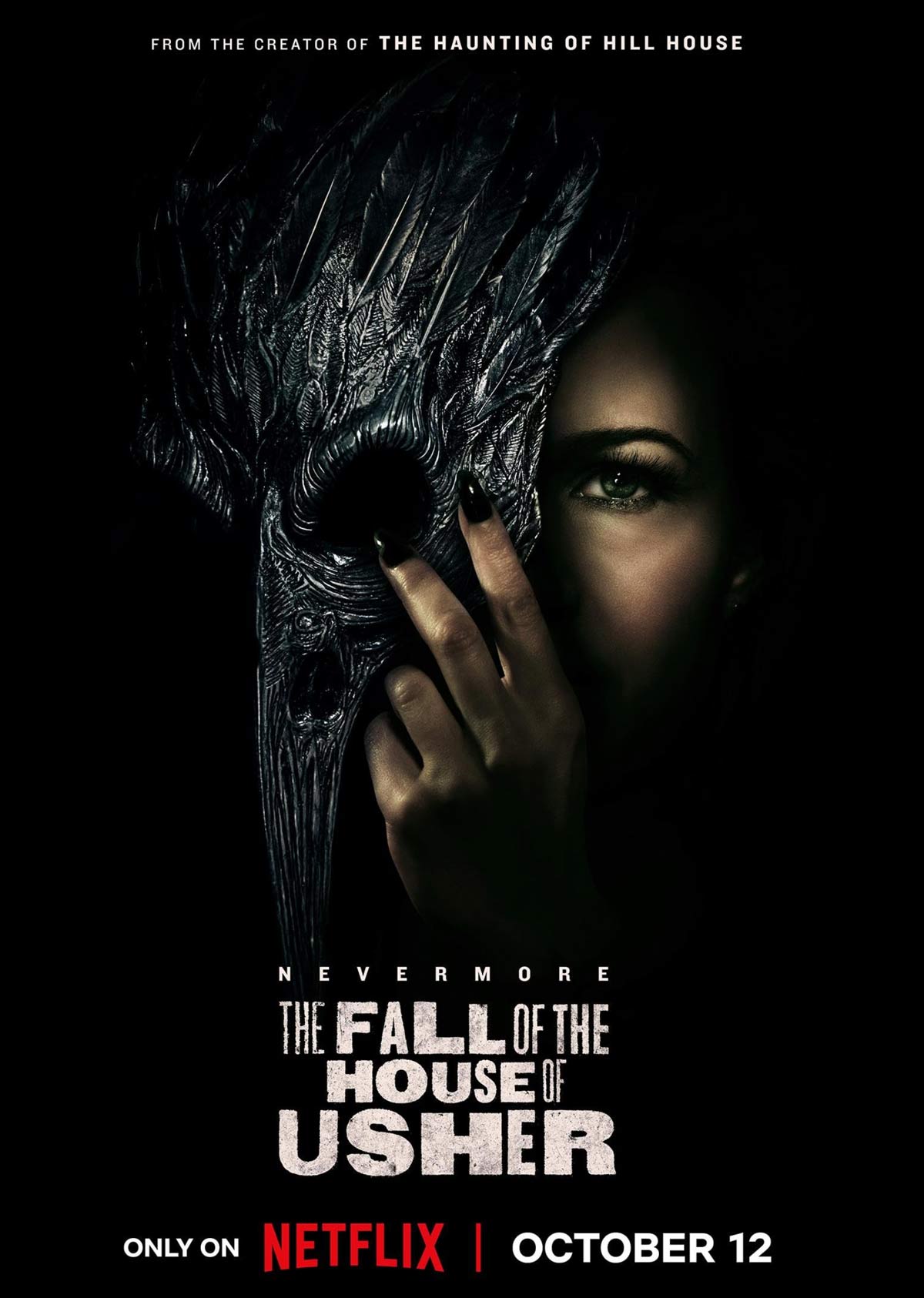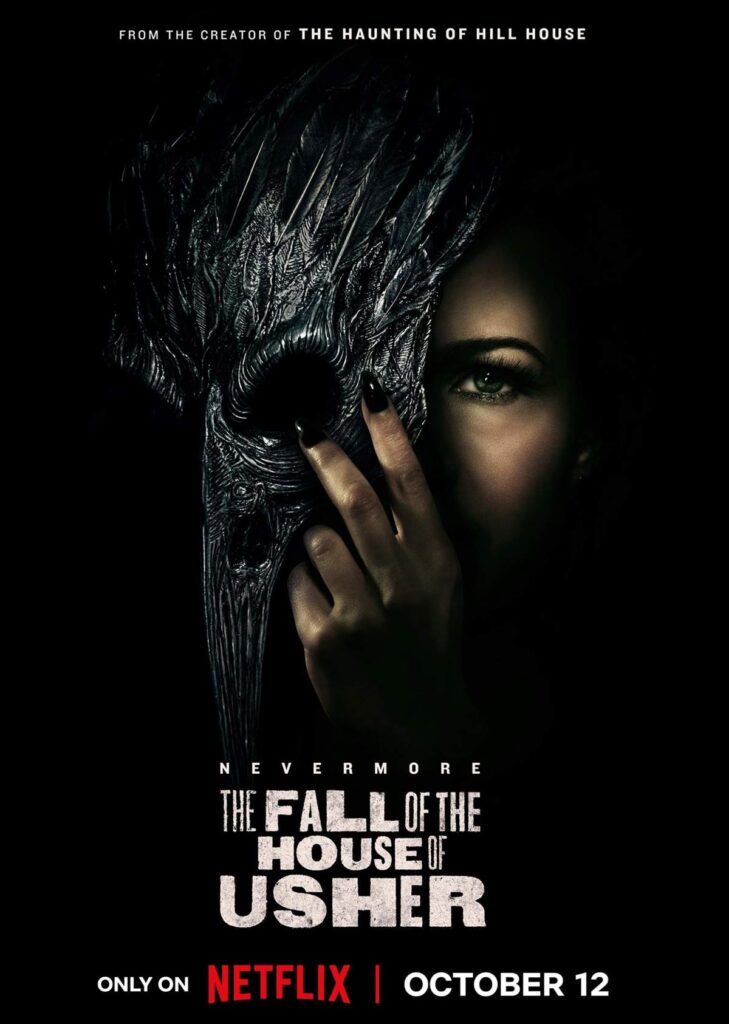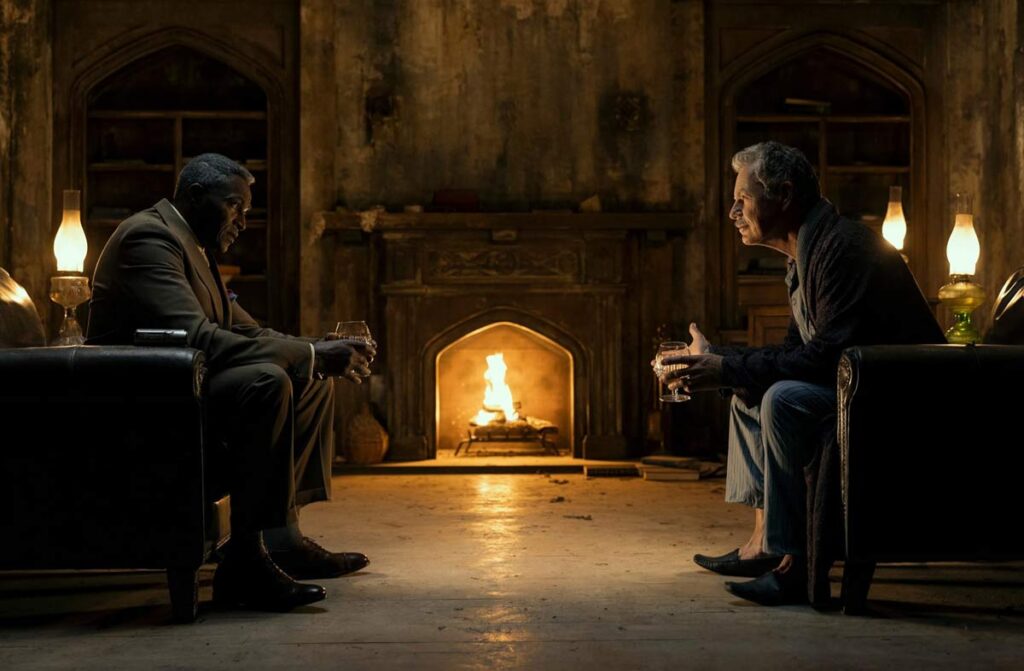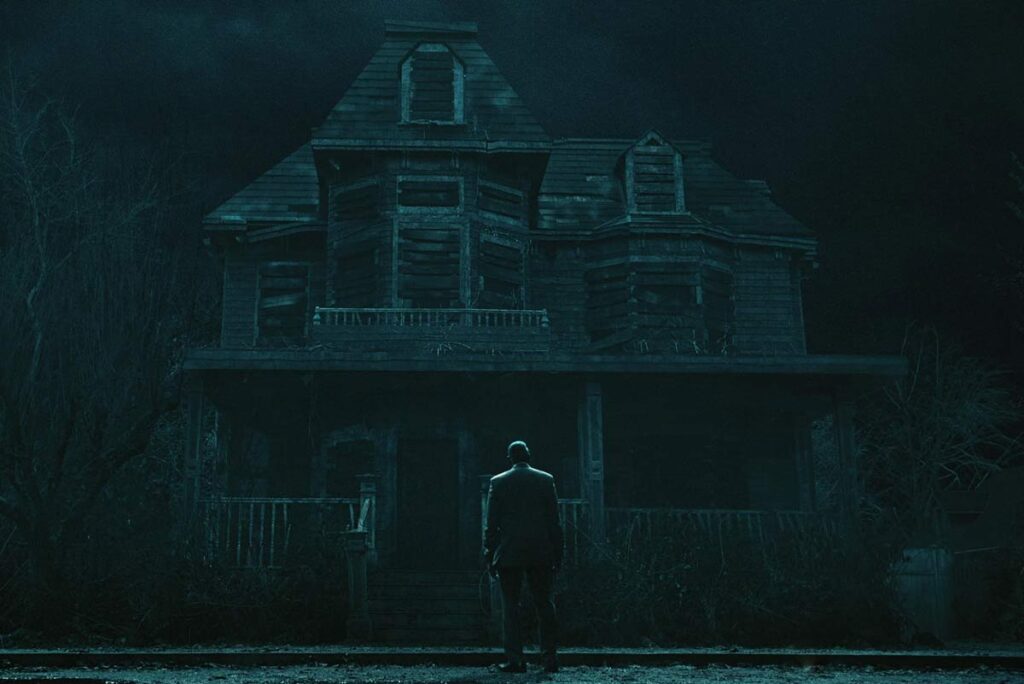by Bruce G. Hallenbeck
ORDER A COPY OF POE PICTURES by Bruce Hallenbeck HERE
To those of us weaned on classic horror, the modernised versions of tales by Shirley Jackson, Henry James and Poe created by writer/producer/director Mike Flanagan are something of an acquired taste. Born, appropriately, in Salem, Massachusetts in 1978, Flanagan’s early career encompassed such contemporary horror films as Absentia (2011), Oculus (2013) and Ouija: Origin of Evil (2016). It wasn’t until he directed, wrote and edited his adaptation of the 1992 Stephen King novel Gerald’s Game (2017) that he began adapting the works of other authors for Netflix, who released the production on their streaming service to critical acclaim and positive audience reaction.
This led to Flanagan performing the same chores (plus producing) his modern take on Jackson’s The Haunting of Hill House for Netflix the following year. Jackson may indeed have been horrified by the liberties taken with her famous novel in this miniseries, but it was again successful with critics and audiences, leading to Flanagan’s third project for Netflix, an adaptation of James’ The Turn of the Screw, retitled The Haunting of Bly Manor, which premiered in 2020. A long, drawn-out and ultra-modern miniseries version of James’ tale, it too was highly successful and Flanagan formed a company called Intrepid with his partner Trevor Macy to produce horror ‘content’ exclusively for Netflix.
First in this new deal was Midnight Mass, an original seven-episode miniseries about supernatural happenings on a small, remote island. All of these Netflix projects had one performer in common: the superb actress Carla Gugino. She had given a tour-de-force performance in Gerald’s Game, and was arguably the best aspect of the other three miniseries.
Flanagan’s most ambitious miniseries for Netflix is undoubtedly his modern version of Poe’s The Fall of the House of Usher (2023). And if you’re wondering how he made an eight-episode miniseries out of a short story, the answer is: he didn’t. He took Poe’s central conceit of a family in decay and turned it into a commentary on today’s white-collar criminals in the opioid pharmaceutical industry. More importantly, however, each episode of the miniseries was loosely based on a different Poe tale in which the central protagonist was a member of the Usher family: Masque of the Red Death, The Tell Tale Heart, Murders in the Rue Morgue, The Black Cat, The Pit and the Pendulum and The Raven are all represented here, albeit at times unrecognisably.
Flanagan’s House of Usher takes place in 2023, beginning after Roderick Usher (Bruce Greenwood) has lost all six of his grown children to various grotesque and tragic deaths. Usher is the powerful billionaire behind Fortunato Pharmaceuticals, a corrupt company that has ignored the deleterious effects that some of his drugs have had on an unsuspecting populace. The evening after the last funeral for his children – who have all died within the space of two weeks – Usher invites Assistant United States Attorney C. Auguste Dupin (Carl Lumbley) to the house where he and his sister Madeline Usher (Mary McDonnell) grew up. Dupin has based most of his career on exposing the corrupt business practices of Fortunato Pharamceuticals and he is intrigued that Usher has finally agreed to tell him all of his family’s secrets.
The miniseries recounts two timelines of the Usher family: the first takes place between 1953 and 1980, when Roderick and Madeline were young and eventually rose to power. The second follows Roderick’s children during the previous two weeks, showing the gruesome fates of each. Both timelines are told in flashback by Usher to Dupin.
Originally, distinguished stage and film actor Frank Langella (Dracula, 1979) was slated to play Roderick Usher, and in fact he filmed several scenes before he was fired in April 2022 due to a sexual misconduct investigation. ‘I’ve been cancelled,’ Langella moaned to the press, and he was quickly replaced in the role by Greenwood, who had already worked for Flanagan in the latter’s Stephen King adaptation Doctor Sleep (2019).
Production on The Fall of the House of Usher wrapped on 9 July 2022. The first two episodes were screened at Fantastic Fest in Austin, Texas in September 2023 and the miniseries began streaming on Netflix on 12 October.
The first episode, ‘A Midnight Dreary,’ is the weakest. We’re introduced to all of the Ushers, an unlikable clan if ever there was one, and it’s difficult to identify with any of them. In the present, a trial begins to unfold that will hold the Usher family responsible for the deaths of thousands who were taking Fortunato’s drug Ligadone, a clear reference to the real-life opioid epidemic. There is apparently an informant within the family who is doling out its secrets, but whom?
There’s also a flashback to 1962, when Roderick and Madeline are children and their mother Eliza (Annabeth Gish) is buried prematurely. She finds her way out of her grave to take revenge on her employer, the then-head of Fortunato, William Longfellow (Robert Longstreet). Gish gives the best performance in this episode, and her portrayal is literally a haunting one, with strong echoes of Poe’s original character of Madeline Usher. The name ‘Eliza’ is a reference to Poe’s mother, Eliza Poe.
The present-day scenes fare less well and come across as more contemporary, ordinary fare, along the lines of series about corporate greed such as HBO’s Succession…except for the intriguing scene in which Roderick apparently sees the ghosts of his dead children and collapses on the street. In another flashback, he tells Dupin of a fateful meeting with a mysterious woman named Verna (Gugino) that took place on New Year’s Eve of 1980.
The opening scene, however, is of interest, as the first words spoken in the episode are those of Poe – and they’re delivered by an actor who once played him, Mark Redfield. His independent film The Death of Poe (2006) is one of the best Poe-related movies of recent years. He plays a preacher in Flanagan’s miniseries and one can only imagine how thrilling it was for the actor to once again mouth some of Poe’s words.
The opening episode drops a lot of familiar Poe names – Tamerlane, Prospero, Pym, and even Poe’s real-life rival Rufus Griswold – but in very modern contexts. Aside from the references – and a cut to a shot of a raven when Roderick collapses on the street – there is very little of Poe in it. The present-day setting is, in fact, rather off-putting at first and one wonders if following episodes will be any more Poesque.
The second episode dispelled any fears in that regard; Flanagan’s modern take on The Masque of the Red Death is visually stylish, and while it may not cause anyone to forget Roger Corman’s masterful 1964 film, it has an atmosphere all its own. Prospero ‘Perry’ Usher (Sauriyan Sapkota) decides to host a masquerade party at one of Fortunato’s condemned properties and invites Morella (Crystal Balint), the wife of his brother Frederick (Henry Thomas), whom he intends to seduce. The party is crashed by Verna in a red death costume, who tries to convince Perry to stop the party, which is supposed to climax, as it were, with water from the overhead sprinklers to signal that an orgy will then take place. Perry refuses to stop the festivities, and when the sprinklers turn on, they spray acid and chemical waste, causing horrible deaths for all – except for Morella, who is hideously burned.
The Masque of the Red Death is beautifully designed and well-acted, with Gugino taking the honours as the most memorable character, Death. Perry gets his just desserts, but Morella – the name is taken from the Poe story, of course – is left alive for more Poesque activities.
Episode three, Murder in the Rue Morgue (note the singular rather than Poe’s plural) isn’t quite as good as the previous tale, and has an even looser connection to the Poe story. This one has to do with medical tests on animals and its only real similarity to the original story involves a chimpanzee mauling Camille Usher (Kate Siegel) to death.
Murder in the Rue Morgue is a bit of a limp episode, its only memorable feature being Siegel’s performance as a vile and quite inhuman member of the Usher clan. Gugino’s disguise this time is a dual one: as an escort for Bill (Matt Biedel), the husband of Tamerlane Usher (Samantha Sloyan) and as a security guard at the research lab. Unfortunately, Gugino doesn’t get as much to do in this episode as in the previous one, but what she does, she does well.
The fourth episode is The Black Cat, a rather interesting take on that oft-told tale, featuring Rahul Kohli as Napoleon ‘Leo’ Usher, one of Roderick’s illegitimate children, who adopts a black cat which ends up tormenting its drug-addicted master. Interestingly, he was given the cat by Verna, whom he implores to take back the animal. During a struggle, he gouges out the cat’s eye, and Verna ends up with precisely the same injury. Ultimately, Leo’s drug-induced stupor causes him to fall to his death from his balcony.
This retelling of the tale has many similarities to Dario Argento’s version of the same story that formed half of the 1990 feature Two Evil Eyes, although it isn’t quite as hallucinatory or stylish. Still, it packs a good, gory punch and Gugino’s part in the proceedings is quite memorable.
The Tell-Tale Heart, the fifth episode, is a rather ingenious update of the tale. Another medically-themed episode, it transpires that surgeon Victorine Usher (T’Nia Miller) has murdered her wife and co-worker Ali (Paola Nunez) after the latter threatened to expose the corruption of the Usher family after discovering that Victorine was using illegal animal tests to develop a heart mesh. After killing Ali, Victorine uses the heart mesh on her and she is ultimately driven to madness by the ticking of the device. She ends up committing suicide in front of Roderick. It’s pretty grim stuff, but clever and well-acted.
Episode #6, Goldbug, is a satire on the so-called ‘wellness’ industry, having virtually nothing to do with Poe’s story ‘The Gold Bug.’ Tamerlane Usher (Samantha Sloyan) is a would-be entrepreneur developing Goldbug as a mixture of health product, beauty product and lifestyle brand. This is a rather ponderous episode until the last few minutes, when the omnipresent Verna shows up and taunts Tamerlane who is haunted by hallucinations involving her husband Bill, Verna and a hooker in a sex tape. Verna appears in a mirror overhanging Tamerlane’s bed, and Tamerlane smashes it, impaling herself on shards of glass. Except for the ever-reliable Gugino, this is a so-so episode, although Tamerlane is a particularly odious character who, like all the Ushers, deserves what she gets.
The penultimate episode, The Pit and the Pendulum, highlights Frederick, who is now hooked on cocaine. Perhaps hooked on the past as well, Frederick enters the building where Perry and his partygoers were killed, as it is about to be demolished. Inside the building, he snorts cocaine and collapses. The crew bulldozing the building have no idea there’s someone inside, and they proceed to demolish it. The collapsing structure forms a pendulum that bisects the unfortunate Frederick. It’s certainly an interesting twist on Poe, although it lacks the looming dread that the original story possessed.
The final episode, The Raven, at last returns us to the title story, although it combines it with ‘The Cask of Amontillado’ in a flashback sequence in which Roderick and Madeline wall up Griswold in the basement. When we return to the present, Roderick has finished confessing to Dupin, which is the cue for Madeline to emerge from her cataleptic state and strangle Usher. Although never quite as frightening as it should have been, it’s a fitting end to the miniseries, with the old, dilapidated house settling into the tarn ala Poe.
Flanagan’s The Fall of the House of Usher is uneven, like most of his work, but elevated by a sterling cast, the standouts being Gugino as Verna aka Death aka The Raven; Greenwood’s haunted Roderick; a nice turn by Luke Skywalker himself, Mark Hamill, as ruthless family attorney Arthur Gordon Pym; and McDonnell as the Machiavellian Madeline. It may not be pure Poe – not by a long shot – but the constant Poesque name checks and situations make it unmissable.





